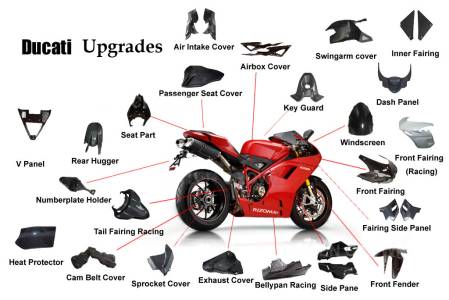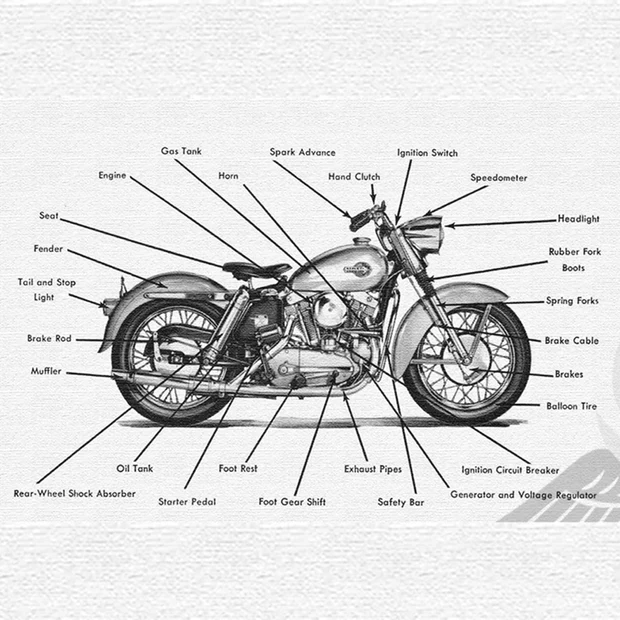FAQs Answered About Ordering Motorcycle Spares Christchurch Online
Wiki Article
Discover the Vital MotorBike Parts You Required for Optimal Performance
Recognizing the crucial parts of a motorbike is fundamental for attaining peak efficiency. Each component, from the engine to the braking system, plays an important role in overall performance and security. Normal upkeep can prevent unexpected failures and improve the riding experience. Nonetheless, several riders ignore the ins and outs of these systems. Discovering how they collaborate can bring about an extra reliable ride. What essential components should every rider prioritize?The Engine: The Heart of Your Motorbike
The engine works as the core element of a bike, driving its efficiency and defining its capacities. It is in charge of transforming gas right into power, which powers the bike ahead. Various sorts of engines are employed, consisting of single-cylinder, V-twin, and inline arrangements, each offering distinct attributes fit for different riding purposes and designs. The engine dimension, generally gauged in cubic centimeters (cc), significantly influences performance, with bigger engines usually supplying more power and torque.Furthermore, the engine's design and modern technology, such as fuel shot systems or air-cooling versus liquid-cooling, impact efficiency and integrity. Maintenance is essential for peak operation; aspects like routine oil adjustments and monitoring ignition system guarantee longevity. Riders usually think about an engine's responsiveness and smoothness, as these qualities improve the overall riding experience. Eventually, the engine stays an important component that specifies not just the motorbike's efficiency but additionally the motorcyclist's link to the machine.The Transmission: Moving Gears Smoothly
The transmission plays a necessary role in a motorcycle's performance, especially in the technicians of equipment moving. Recognizing how to move equipments efficiently can boost the overall riding experience, while regular upkeep guarantees peak performance. Correct interest to these aspects can considerably influence the longevity and efficiency of the motorbike.
Gear Shifting Mechanics
Smooth gear changing is vital for suitable motorcycle efficiency, greatly influencing both velocity and control. The mechanics of equipment shifting include the communication in between the clutch, gear bar, and transmission system. When a cyclist engages the clutch, it disengages the engine from the transmission, permitting a gear change without damaging the components. A well-timed launch of the clutch, combined with exact motion of the equipment bar, helps with a seamless modification in between equipments. This procedure ensures that the engine runs within its ideal power band, boosting efficiency. Motorbike Components NZ. In addition, understanding the gear ratios and their result on speed and torque can help riders make notified selections throughout changes, eventually adding to a more pleasurable and receptive riding experienceMaintenance Tips Significance
Routine maintenance plays a vital function in ensuring that the transmission system runs efficiently, enabling smooth equipment shifts. Frequently altering the transmission and checking fluid is vital, as old liquid can cause raised rubbing and wear. Furthermore, examining the clutch for wear assurances peak interaction and disengagement, avoiding slippage during equipment adjustments. Lubrication of relocating parts is equally vital to reduce friction and boost performance. Motorbike proprietors need to additionally monitor for leakages and unusual sounds, as these can suggest underlying problems. By sticking to these upkeep ideas, bikers can extend the life-span of their transmission system, guaranteeing that gear changes stay seamless and contributing to the total efficiency of their motorbike.The Braking System: Ensuring Safety And Security on Every Ride
Braking systems are basic elements that directly influence a motorbike's safety and efficiency. They consist of various components, consisting of brake pads, rotors, calipers, and hydraulic lines, all working with each other to guarantee efficient slowdown. The sort of braking system-- normally either disc or drum-- influences responsiveness and stopping power.Regular upkeep is important to support peak efficiency; used brake pads can cause decreased efficiency and raised quiting ranges. In addition, the high quality of brake fluid must be kept track of, as it can soak up dampness with time, endangering stopping efficiency.Riders ought to also think about the importance of anti-lock stopping systems (ABDOMINAL MUSCLE), which avoid wheel lockup throughout sudden stops, boosting total safety. Appropriately functioning brakes are not practically stopping; they instill self-confidence in the motorcyclist, permitting for more secure navigation with different terrains. Ultimately, a dependable braking system is critical for appreciating every trip with satisfaction.The Suspension: Enhancing Comfort and Control
A well-functioning suspension system significantly contributes to a motorbike's general efficiency, complementing the performance of the braking system. The suspension plays a significant duty in taking in shocks from irregular surfaces, assuring a smoother experience while keeping tire contact with the road. This get in touch with is necessary for both stability and control, enabling bikers to navigate edges with self-confidence and precision.Different types of shock absorber, such as telescopic forks or mono-shocks, supply varying degrees of convenience and handling. Correctly tuned suspension enhances responsiveness, giving the motorcyclist with a much more connected feeling to the motorbike. Regular upkeep checks are necessary to establish the suspension elements, including springs and dampers, are operating at their best. An effective suspension system not just raises the riding experience but additionally adds to the durability of other motorcycle parts by decreasing deterioration. As an outcome, purchasing quality suspension is crucial for any kind of severe motorcycle lover.
The Tires: Connecting You to the Roadway
Tires play an essential function in a motorcycle's performance, working as the main web link between the cyclist and the road. Comprehending the various kinds of tires offered can substantially influence managing and safety. Furthermore, routine upkeep is important to guarantee peak tire efficiency and long life.Tire Enters Explained
Just how do various tire kinds influence a motorbike's efficiency? Tire kinds play an essential duty in identifying a motorcycle's stability, grip, and handling. Sport tires, created for high efficiency, deal enhanced traction and responsiveness on paved roads, making them optimal for competing and hostile riding. Alternatively, exploring tires focus on resilience and comfort, offering a smoother adventure for long-distance travel. Off-road tires, characterized by their sturdy step patterns, master grip on unpaved surface areas, appropriate for experience fanatics. In addition, dual-sport tires mix features from both off-road and on-road categories, dealing with functional riding demands. Eventually, picking the ideal tire type is vital for enhancing efficiency, making sure security, and enhancing the general riding experience.Upkeep Tips Offered
While riding on the roadway, preserving perfect tire condition is important for safety and security and efficiency. On a regular basis inspecting tire stress is essential, as under-inflated tires can cause inadequate handling and raised wear. It is suggested to inspect step depth regularly; worn tires compromise grasp and stability. Furthermore, riders should seek indicators of damages, such as bulges or cracks, which can show the need for substitute. Turning tires occasionally guarantees also put on, boosting long life. Moreover, maintaining tires clean from debris and staying clear of extreme aesthetics can prolong their life expectancy. Keeping correct alignment and equilibrium contributes to peak performance, decreasing anxiety on other bike elements. Complying with these maintenance pointers will greatly boost the total riding experience.The Gas System: Fueling Efficiency and Effectiveness
The gas system plays a crucial role in taking full advantage of a motorbike's performance and performance, as it assures the ideal delivery of fuel to the engine. It consists of numerous vital parts, consisting of the gas tank, gas pump, gas filter, and gas injectors or carburetor. Each component needs to work efficiently to assure a smooth and effective ride.The fuel container stores gas and provides it to the engine using the gas pump, which produces the necessary stress. A gas filter stops impurities from entering the engine, while the injectors or carburetor mix fuel with air for combustion.Proper maintenance of the fuel system is critical; a blocked filter or malfunctioning injector can bring about lowered efficiency and boosted fuel consumption. By confirming that the fuel system operates effectively, cyclists can appreciate enhanced throttle feedback, much better gas economic situation, and generally improved riding experience.The Electric System: Powering Your Experience
A reliable electrical system is crucial for the total capability and safety and security of a motorbike, as it powers vital elements such as the ignition, lighting, and numerous digital systems. This system consists of the battery, which shops power, and the alternator, accountable for producing power while the engine runs. The circuitry harness links these elements, ensuring trusted power distribution.Additionally, integrates shield the system from overloads, while relays help manage high-current devices with low-power signals. A well-kept electric system improves performance by guaranteeing smooth starts and constant procedure of lights and signals, essential for rider visibility and safety.Regular checks of the battery's cost and connections are essential for protecting against electric failings. Cyclists must additionally examine wiring for deterioration, making certain all parts work preferably. Eventually, a durable electric system contributes significantly to the overall performance and dependability of the motorcycle.Frequently Asked Questions
Exactly how Typically Should I Change My Motorbike's Battery?
The frequency of motorbike battery replacement depends on use and maintenance (Bike Parts Wellington). Normally, batteries should be replaced every three to 5 years. Regular checks can help identify when a replacement is required for peak performanceWhat Tools Do I Required for Fundamental Motorcycle Maintenance?
For fundamental bike maintenance, one needs vital tools such as a socket collection, wrenches, screwdrivers, pliers, tire stress scale, and a torque wrench. These devices help with reliable maintenance and assure the motorbike runs efficiently and safely.How Can I Improve My Bike's The rules of aerodynamics?
To Motorcycle Spares Christchurch enhance motorcycle aerodynamics, one need to think about readjusting fairings, making use of windscreen expansions, enhancing body placement, and lowering total weight. These adjustments assist decrease drag, improving stability and fuel efficiency during experiences.What Are the Indications of a Failing Electrical System?
Signs of a falling short electrical system consist of lowering lights, difficulty starting, uneven tool analyses, and blown merges. Motorbike Components NZ. Unusual smells or rust around battery terminals may also show underlying issues needing prompt interest for safety and efficiency
Exactly how Do I Choose the Right Oil for My Motorcycle?
When picking oil for a motorbike, one need to consider the manufacturer's requirements, viscosity scores, and the kind of riding. Furthermore, traditional versus artificial oil can impact efficiency and engine security, influencing the decision substantially. The engine dimension, generally determined in cubic centimeters (cc), considerably affects performance, with bigger engines typically offering even more power and torque.Furthermore, the engine's style and modern technology, such as gas shot systems or air-cooling versus liquid-cooling, affect performance and reliability. A well-functioning suspension system greatly contributes to a motorcycle's overall performance, complementing the effectiveness of the stopping system. The gas system plays a crucial duty in maximizing a motorcycle's performance and effectiveness, as it assures the optimum distribution of gas to the engine. A fuel filter protects against pollutants from getting in the engine, while the injectors or carburetor mix gas with air for combustion.Proper upkeep of the gas system is important; a clogged filter or malfunctioning injector can lead to lowered performance and boosted fuel consumption. A properly maintained electric system boosts efficiency by guaranteeing smooth starts and consistent procedure of lights and signals, important for cyclist exposure and safety.Regular checks of the battery's cost and links are important for protecting against electrical failings.Report this wiki page